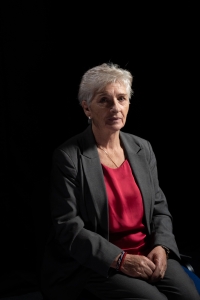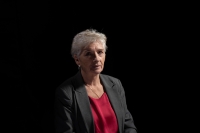„That‘s where the mothers from those families went...to choose their servant girls.“

Stáhnout obrázek
Jiřina Tóthová was born on November 27, 1947, in the west-czech region, in Tachov. She comes from six children, with three siblings from her mother‘s second relationship. When she was only three years old, her father died in a work accident. Jiřina‘s mother, originally from the Soviet Union, was born in 1924 in Záporožie. The reason why she ended up in Tachov, Czech Republic, was the outbreak of the Second World War, which resulted in the families of German soldiers looking for nannies and domestic helpers, preferably young girls, also in her homeland. Apart from her, all her sisters, who were determined to leave home because of bad relations with their father‘s second wife, went through the process. Jiřina‘s mother ended up in Tachov, in a family with six children. She was definitely not bored, but in addition to all her duties, she managed to learn the German language at a very high level. Tachov thus became her new home, which she did not leave even after the German family she worked for was displaced in 1948. Jiřina‘s father, who came from a Czech family with German roots, was born in 1921. He worked as a truck driver at the West Bohemian Works. The Štychov family was not satisfied with the choice of the bride, so after his death they cut off all contact with both the bride and the grandchildren. After the death of Jiřina‘s father, her mother met a certain Damo, but he succumbed to alcohol, so it was not easy for a woman with six small children. Jiřina started attending a local elementary school in 1954, followed by entry into the Secondary General Education School, which she successfully completed in 1965. She had little choice, probably due to a bad staff report. Immediately after that, she started working as the director‘s secretary at the West Bohemian Timber Works. In addition to working remotely, she graduated from the Secondary School of Economics in Marianske Lazne. In August 1971, she met her future husband, Štefan Tóth, who worked as a professional soldier in Tachov. They got married in 1973 and he was the reason why she moved to eastern Slovakia. Shortly after the wedding, they had a daughter, Ingrid, and a son in 1980. Due to Štefan‘s work, the family moved several times. First it was Poprad, later Kežmarok and in October 1982, they anchored in Košice. Jiřina‘s husband started working there as a teacher at the aviation school. After maternity leave, Jiřina got a job at the same workplace, but as part of the financial department, i.e. as a civil worker. Currently, Jiřina still lives in Košice and has even become part of the Czech Association, which makes her very happy.

